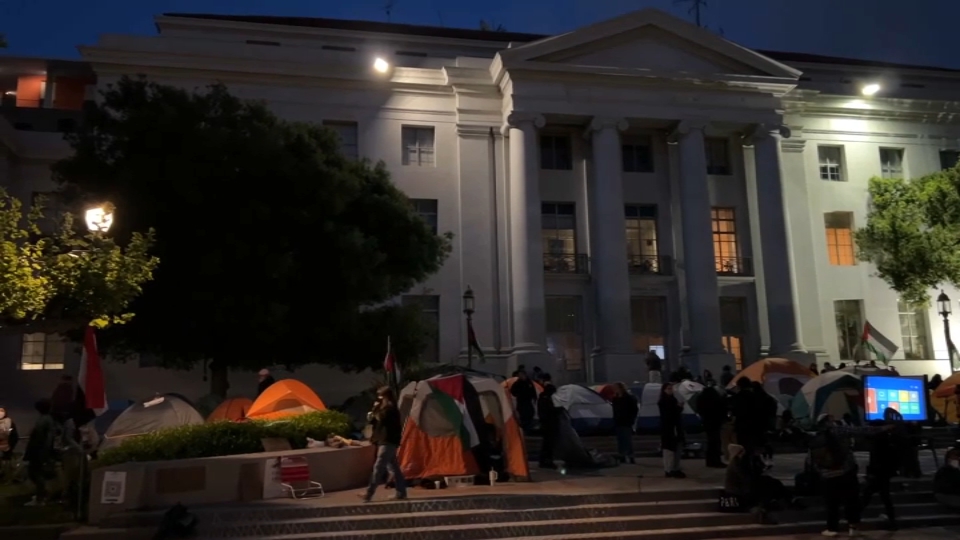Hours after completing what's been billed as the hardest climb in the world, the two free climbers who summited El Capitan's "Dawn Wall' in Yosemite National Park spoke from hard ground for the first time in 19 days.
"What was it about this climb that is capturing everyone's attention?" Kevin Jorgeson, 30, of Santa Rosa, California asked rhetorically. "It's the opportunity for everyone to find their own Dawn Wall. We had our project that we saw through until the end. What's yours?"
Jorgeson and climbing partner Tommy Caldwell, 36, of Estes Park, Colorado talked to the media on Thursday, describing how happy they were to have climbed the 3,000 feet of granite wall - using only their hands and feet - in a historic and unprecedented climb, which got a nod from the president of the United States.
Well, Jorgeson talked.
Caldwell had lost his voice.
"I remember grabbing the very top and pausing for a minute to make sure it was real," Jorgeson told Today Show hosts Matt Lauer and Savannah Guthrie before the main news conference. "And then the cheers erupted and it was."
On Wednesday at 3:30 PT, the climbing buddies reached the top of the hardest routes to climb on "El Cap," using ropes only as a crutch when they fell. They were accompanied by a team of professional photographers and sponsors who helped spread the word of their ascent, while they blogged and tweeted about their climb on social media as well. Thanks to solar chargers, the young men were able to talk to loved ones on their cell phones every day, and even watch Netflix movies and listen to Pandora music while suspended on portaledges high in the air.
So proud of @TommyCaldwell1 and @KJorgeson for conquering El Capitan. You remind us that anything is possible. -bo pic.twitter.com/XcDwHqv2ry
— The White House (@WhiteHouse) January 15, 2015Jorgeson told "Today" that it was actually pretty peaceful up there, albeit dangling above ground.
"It was quite relaxing," he said, noting they didn't climb all of the 19 days. In fact, he rested for several days while waiting for his bloody fingers to heal. Some days, Jorgeson said, he and Caldwell, just hung out "stretching and drinking coffee and water."
Caldwell wasn't completely left out of the conversation. He gave two thumbs up signs when asked how his first hot shower, meal and real bathroom break felt after setting off on the climb of a lifetime on Dec. 27.
Later in the morning, Caldwell's voice returned, and he described to reporters how great it felt, even being so "dirty and smelly" to returning to the ground to grab "my wife and kid."
Jorgeson also admitted to the crowd that while he remained positive, even while falling and failing on Pitch 15, "I'd be lying if I didn't have my doubts." But when he did succeed, and finish the last pitch, "You feel the stress drip off of you. It's the coolest feeling. There's no where else to go. You're standing on top."
Local
While the two made history, there has been some controversy about extreme athletes taking things too far.
In November 2014, Rock and Ice climbing magazine first reported that Clif Bar of Emeryville dropped the sponsorship of five professional climbers saying that those climbers take on risks that make the company too uncomfortable to continue financial support.
Those five are featured in Valley Uprising, sponsored by Clif Bar, a film that documents the evolution of Yosemite rock climbing and free soloing - climbing without ropes. The film portrays climbers as rebels who sometimes skirt regulations and engage in illegal activities including BASE jumping. Caldwell is also in that movie but was not part of the five who were dropped.
But Tom Evans, 70, of Crestline, California, a senior staff photographer at Adidas Outdoor who has been blogging and capturing video of Jorgeson and Caldwell said Thursday that it's "ridiculous" to think that Jorgeson and Caldwell are dangerous risk takers. Evans should know, he's climbed El Capitan five times himself.
"This was one of the safest climbs ever done on El Cap," he wrote in an email. "Since the climbing was known to be very difficult the climbers used ropes and gear all the time with back up lines to the ground in case anything did happen."
Evans said, if they had climbed without ropes then it would have been extremely dangerous. "But they did use ropes and gear to insure that no one would be hurt," he said. "Tommy is married and has a young 18-month-old son. Do they really think he would do something so dangerous as to leave his wife and son without a father and husband! Absurd!"
As for Clif Bar and other companies distancing themselves from extreme atheletes, Evans said he supported that decision. Climbing without ropes and BASE jumping is too dangerous and an "ego trip," adding that he's lost friends to those activities. "I never promote or glorify that sport," he said.
But climbing with ropes is a completely different matter, and has become safer over time, Evans said.
"People who make such statements are just showing that they are completely uninformed about climbing and how it is conducted," Evans said.



